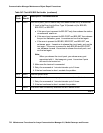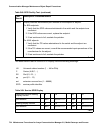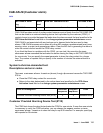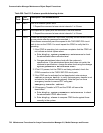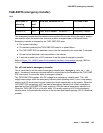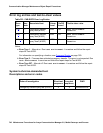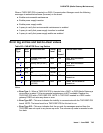
CAB-EXFR (emergency transfer)
Issue 1 June 2005 739
CAB-EXFR (emergency transfer)
G650
The emergency transfer feature connects some central office trunks directly through to analog
user stations when the system has a serious problem or experiences a total power failure.
Emergency transfer is activated by the TN2312BP IPSI when:
● The system is booting.
● The cabinet containing the TN2312BP IPSI board is in power failure.
● The TN2312BP IPSI has detected a loss of control connectivity for more than 70 seconds.
● The server has detected a serious problem in the cabinet.
● A request is made from a SAT command to set the state of emergency transfer.
Refer to Figure 115: G650 Cabinet Environmental Hardware Components
on page 1959 for
further information.
On, off, and auto in emergency transfer
This is introduced to set the state of emergency transfer (set emergency-xfr on | off |
auto location), because a physical switch is not provided on the faceplate of the TN2312BP
IPSI circuit pack to control the state of emergency transfer.
The TN2312BP IPSI supplies -48V DC voltage to an emergency transfer panel. This -48V
supply keeps relays within the emergency transfer panel operating which, in turn, keep analog
stations and CO trunks wired to ports (station and trunk respectively) on the system. When the
TN2312BP IPSI is supplying -48V, the state of emergency transfer is off. When a problem is
detected and the TN2312BP IPSI stops supplying -48V the state of emergency transfer is on.
When the TN2312BP IPSI is in the auto state, it is usually supplying -48V to the emergency
transfer panel, but automatically switches to the on state and stops supplying -48V if it detects a
problem.
MOs name in
alarm log
Alarm
level
Initial SAT command to run Full name of MO
CAB-EXFR MIN test environment location sh Emergnncy Transfer
CAB-EXFR MAJ test environment location l Emergency Transfer




